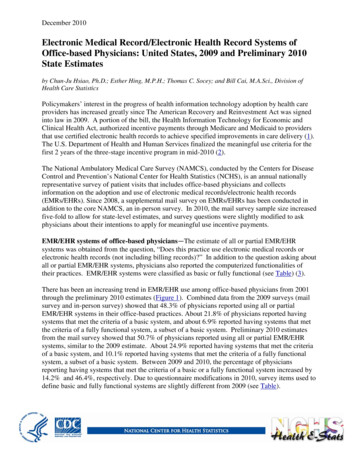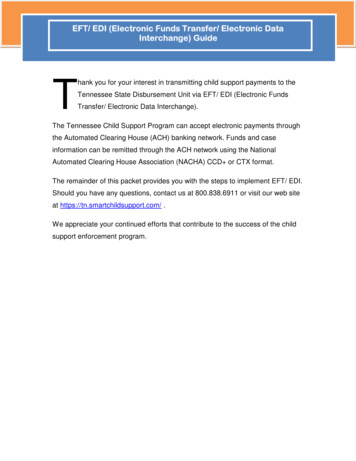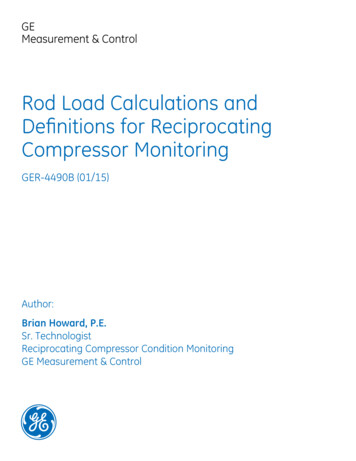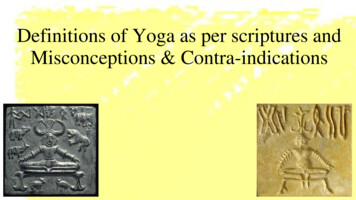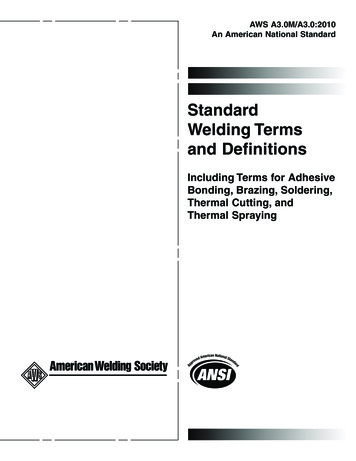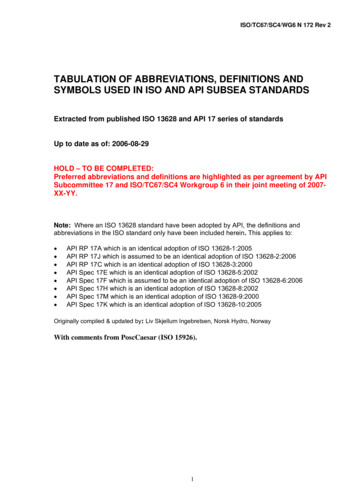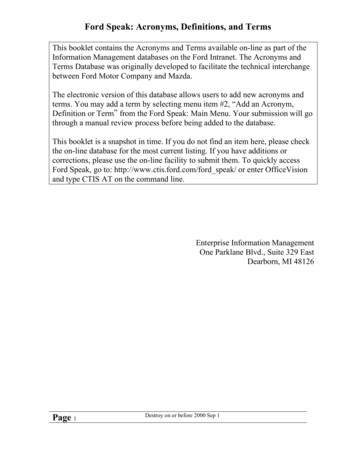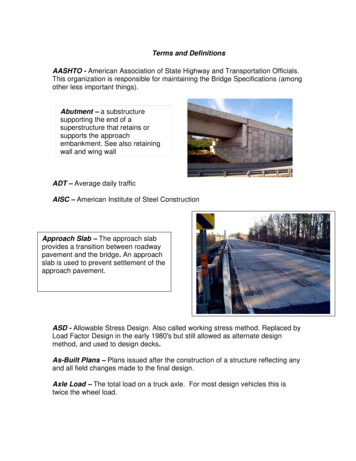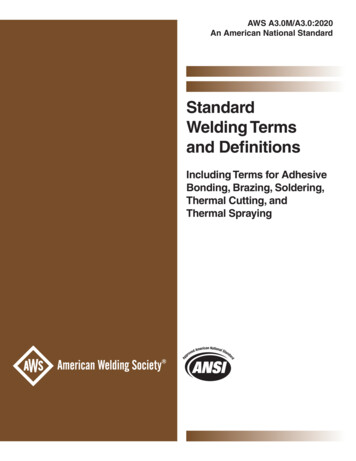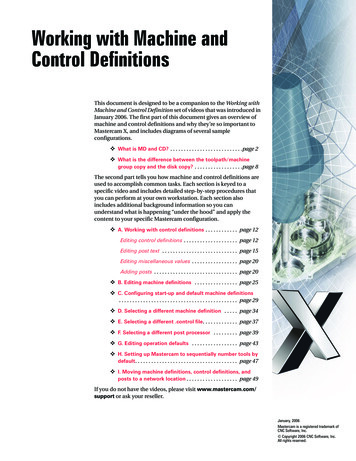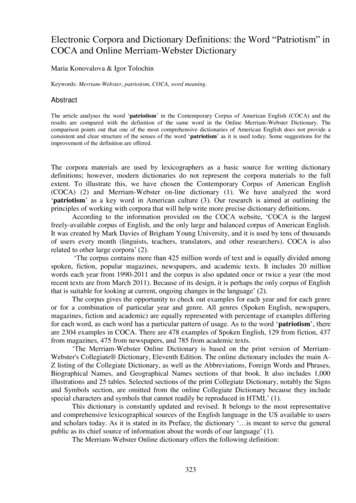
Transcription
Electronic Corpora and Dictionary Definitions: the Word “Patriotism” inCOCA and Online Merriam-Webster DictionaryMaria Konovalova & Igor TolochinKeywords: Merriam-Webster, patriotism, COCA, word meaning.AbstractThe article analyses the word ‘patriotism’ in the Contemporary Corpus of American English (COCA) and theresults are compared with the definition of the same word in the Online Merriam-Webster Dictionary. Thecomparison points out that one of the most comprehensive dictionaries of American English does not provide aconsistent and clear structure of the senses of the word ‘patriotism’ as it is used today. Some suggestions for theimprovement of the definition are offered.The corpora materials are used by lexicographers as a basic source for writing dictionarydefinitions; however, modern dictionaries do not represent the corpora materials to the fullextent. To illustrate this, we have chosen the Contemporary Corpus of American English(COCA) (2) and Merriam-Webster on-line dictionary (1). We have analyzed the word‘patriotism’ as a key word in American culture (3). Our research is aimed at outlining theprinciples of working with corpora that will help write more precise dictionary definitions.According to the information provided on the COCA website, ‘COCA is the largestfreely-available corpus of English, and the only large and balanced corpus of American English.It was created by Mark Davies of Brigham Young University, and it is used by tens of thousandsof users every month (linguists, teachers, translators, and other researchers). COCA is alsorelated to other large corpora’ (2).‘The corpus contains more than 425 million words of text and is equally divided amongspoken, fiction, popular magazines, newspapers, and academic texts. It includes 20 millionwords each year from 1990-2011 and the corpus is also updated once or twice a year (the mostrecent texts are from March 2011). Because of its design, it is perhaps the only corpus of Englishthat is suitable for looking at current, ongoing changes in the language’ (2).The corpus gives the opportunity to check out examples for each year and for each genreor for a combination of particular year and genre. All genres (Spoken English, newspapers,magazines, fiction and academic) are equally represented with percentage of examples differingfor each word, as each word has a particular pattern of usage. As to the word ‘patriotism’, thereare 2304 examples in COCA. There are 478 examples of Spoken English, 129 from fiction, 437from magazines, 475 from newspapers, and 785 from academic texts.‘The Merriam-Webster Online Dictionary is based on the print version of MerriamWebster's Collegiate Dictionary, Eleventh Edition. The online dictionary includes the main AZ listing of the Collegiate Dictionary, as well as the Abbreviations, Foreign Words and Phrases,Biographical Names, and Geographical Names sections of that book. It also includes 1,000illustrations and 25 tables. Selected sections of the print Collegiate Dictionary, notably the Signsand Symbols section, are omitted from the online Collegiate Dictionary because they includespecial characters and symbols that cannot readily be reproduced in HTML’ (1).This dictionary is constantly updated and revised. It belongs to the most representativeand comprehensive lexicographical sources of the English language in the US available to usersand scholars today. As it is stated in its Preface, the dictionary ‘ is meant to serve the generalpublic as its chief source of information about the words of our language’ (1).The Merriam-Webster Online dictionary offers the following definition:323
‘patriotism: love for or devotion to one's country. You may not agree with himpolitically, but no one can question his patriotism. They supported the war with a fiercepatriotism’ (2).The structure of the definition implies that the word is polysemous (marker ‘or’).However, the difference between ‘love for’ and ‘devotion to’ is not clear from the definition. Noris it clear how these two components are relevant for the word's usage.The corpus gives 138 results for the collocation ‘love of country’ versus 45 for ‘love forcountry’, which is three times less. Surprisingly, the authors of the dictionary choose the lessfrequent collocation for the definition.The analysis of the typical contexts for ‘love of’ and ‘love for’ in COCA has shown thatthe collocation ‘love of’ (5535 results in the corpus) indicates a more rational feeling based on amotivated choice and is more often used with the words ‘life’ (530 results), ‘God’ (373 results),‘music’ (156 results), ‘country’ (138 results) and ‘game’ (137 results).There are 3391 results for the collocation ‘love for’ in the corpus. It indicates a moreirrational feeling based on powerful personal attraction and is most often used with the propernames and pronouns like ‘her’ (269 results), ‘him’ (156 results), ‘each other’ (106 results) and‘me’ (106 results).‘2001 (20010923) How Do You Explain September 11 Attacks to Your Children?CNN SunMornThis school is stressing the need to pull together, being better helpers, talking aboutpatriotism, about love of country, and being guardians of its future’ (1).In this typical example, the word ‘patriotism’ and the collocation ‘love of country’ referto the urge to coordinate one’s actions with the commitment to certain social ideals (‘being betterhelpers’, ‘guardians of its future’).‘1995 (19951108) Text of Powell's Announcement Not To Run for PresidentABC BreakingI have a deep love for this country that has no bounds’.Here, the collocation ‘love for country’ is used to denote the overwhelming feeling whichis breaking the borders of rational thought (marker ‘has no bounds’) (1).Thus, the authors of Merriam-Webster define the word ‘patriotism’ as an irrationalfeeling, considering this component of its meaning to be the most important one. At the sametime, the authors of the dictionary see the semantic core of the word ‘patriotism’ as a strongirrational attraction to the institutions of the state; the latter context is considerably more frequentin COCA.There are 10 results for the collocation ‘devotion to country’ in the corpus. There are 4results for the word ‘devotion’ in the 5 words limit before and after the word ‘patriotism’.‘2004 (20040530) Letters from the Front; Letters from soldiers killed in IraqNBC DatelineThey were written by men and women in Iraq who gave that last full measure of devotionto the country and families they loved’ (1).The collocation ‘devotion to the country’ is used to denote the strong positive emotiontowards one’s country. The family and the country are of the same importance (marker ‘and’).This context characterizes the word ‘patriotism’ as a powerful emotion rather than an elementof a rationally structured value judgment.324
The first example of the word ‘patriotism’ provided by the dictionary is the collocation‘question one’s patriotism’ (37 results in the corpus): ‘You may not agree with him politically,but no one can question his patriotism’ (2). This example represents the political context for theword ‘patriotism’. The word ‘patriotism’ stands for a positive character trait of an individualcommitted to the core political ideals. This context is quite frequent in the corpus (about 50% ofall contexts).‘2006 (20060822)NEWS; Pg. A1 Title Bush defends policy: We re not leaving, solong as I m president ;Marc Sandalow, Washington Bureau Chief San Francisco Chronicle# Bush was careful to say he did not question the patriotism of those who oppose hispolicy, saying ‘ they're just as American as I am. ‘ # ‘ I just happen to strongly disagree withthem’ (1).The situation takes place in the USA (‘Bush’, ‘American’). The word ‘patriotism’ is usedin a political context (‘President Bush defending his policy’). The person who has the feeling of‘patriotism’ does not need to agree with the government policy (‘those who oppose his policy’).This example outlines such American values as the freedom of speech and the respect of opiniondifferences (‘they're just as American as I am. ‘ # ‘ I just happen to strongly disagree withthem’). In such contexts ‘patriotism’ stands for a set of rational principles for making importantpolitical choices for the benefit of America.The first example in the dictionary and the corresponding corpus examples have noconnection with the definition ‘love for or devotion to’. First of all, the phrase ‘love for ordevotion to’ signifies the irrational urge as based on strong personal attraction, whereas the word‘patriotism’ in this context denotes the logical and rational readiness to perform one’s civicduty.The second example (‘They supported the war with a fierce patriotism’ (2)) denotes thewar context, in which ‘patriotism’ represents the positive attitude to and a strong emotionalsupport for the military actions performed bу the government (markers ‘war’ and ‘fierce’). Theword ‘patriotism’ is used to express the state of irrational urge; the word ‘fierce’ designates theintensity and emotional rather than rational positive motivation in the situation of a war conflict.There are 4 results for the collocation ‘fierce patriotism’ in the corpus.‘1991 (Dec) Vol. 22 Issue 9, p16, 3p, 1bw Around the Mall and beyond. Park, EdwardsSmithsonianDriven by fierce patriotism, he flew to France in August 1914 with a Lewis machine gunlashed on his feeble Farman two-seater. With it, he tried to attack the first enemy he saw butfound his crate was too overloaded to climb higher than 3,500 feet. The Germans, going abouttheir business at 5,000 feet, were apparently unaware of Strange as his gunner angrily sprayedthe sky with bullets.’ (1)This example presents the same structure of the situation as the example from thedictionary. In this example, the irrational nature of the main character's actions is stressed(markers ‘feeble Farman two-seater’, ‘too overloaded to climb higher than 3,500 feet’, ‘gunnerangrily sprayed’). Thus ‘fierce patriotism’ is an emotional drive to act without much rationalthought. The futility of this emotion is also ironically pointed out in this passage.There are 52 results for the word ‘war’ in the 5 words limit before and after the word‘patriotism’:‘1991 (19910421) AFTER THE WAR;Pride in Victory Lingers, if Clouded by MiddleEast Chaos and Kurds' Agony New York Times‘During the war, I was affected by all the patriotism and agreed that the war wasnecessary, ‘ said Josie Valderrama, a 17-year-old high school student in Los Angeles. ‘ Now I325
think:' What's so great about what we did? We wiped out an army that didn't have a chance inthe first place.' (1)In this example the word ‘patriotism’ denotes the strong feeling which can make peoplebehave in an irresponsible way they can later regret (marker ‘affected by all the patriotism’). Itis interesting to note the use of the definite article before the word ‘patriotism’. There are 106results of such use out of the overall number of 2304 results for the word ‘patriotism’ in thecorpus, which shows that such use is not common.Thus, the COCA materials allow us to conclude that The Merriam Webster OnlineDictionary fails to distinguish between two senses of the word ‘patriotism’ in contemporary use:in the political context the word ‘patriotism’ is used to denote an element of a rational valuejudgment, motivating the individual to make decisions for the benefit of America; in the militarycontext, the same word represents a powerful emotional drive to fight the enemy or to supportthe government’s military actions. Moreover, the COCA materials allow us to establish one moresense of this word, which has been overlooked by the Dictionary:‘2002 (20020704) Interview: Mario Aberle discusses painting the front of his house asthe American flag ROBERT SIEGEL NPR ATCAfter September 11th, we went out to try to find a flag so we could show our patriotismand our support of the victims, and we couldn't find one, so we ended up painting the entire frontof our house as the American flag.’(1)The word ‘patriotism’ denotes an attachment to rituals involving state symbols (marker‘went out to try to find a flag’). This type of situation can not be attributed to either of the twosenses discussed above; such contexts often demonstrate the evaluative ambivalence of the word‘patriotism’ as it can be used negatively. This sense is common in fiction and political cartoons.For instance,‘2009 (091125) Pg. B-10 The Open Forum DenverMany of our ‘real Americans’ who publicly spout their patriotism and religiosity hidebehind God and the flag to cover up the fact that their greedy, partisan (and indeed, unAmerican) deeds represent their real agendas’ (1).Or‘1995 (19950925) DISCUSSION OF O.J. SIMPSON'S STATEMENT IN COURT,WELFARE AND MEDICARE REFORMInd LimbaughActual American people showed up, ladies and gentlemen. And they're waving the flag,proud to illustrate their patriotism. But they weren't there with the Democrats when theyconducted their own hearings. I mean -- and it's so illustrative. These people are on the outside.They are all wet. They are out in the rain. They are so out of the mainstream now. They makefools of themselves. And they do it on purpose. The Republicans didn't schedule any of that’ (1).The markers of positive evaluations are ‘proud to illustrate their patriotism’, ‘They areall wet’, ‘The Republicans didn't schedule any of that’ (1).The typical markers of this context are ‘the nation significantly embraced the flag as asymbol of American patriotism’, ‘to fly the flag more ostentatiously’, ‘wearing flag pins’, ‘wearan American flag, hang the flag, wear red, white and blue, say “I love America”’, ‘takepatriotism to new length with red, white and blue silk tie’, ‘don’t burn that flag kid. Somedayyou may want to wrap yourself in it’, ‘a maple-leaf-on-the-sleeve style of patriotism’, ‘flagwaving displays of patriotism’, ‘in a fit of patriotism Big Tom has built a twenty-foot replica ofthe Statue of Liberty’ (1). In suc
Webster's Collegiate Dictionary, Eleventh Edition. The online dictionary includes the main A-Z listing of the Collegiate Dictionary, as well as the Abbreviations, Foreign Words and Phrases, Biographical Names, and Geographical Names sections of that book. It also includes 1,000 illustrations and 25 tables. Selected sections of the print Collegiate Dictionary, notably the Signs
